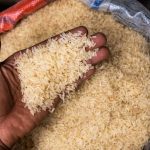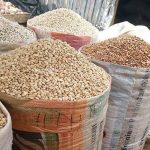Nigerians may soon enjoy significant relief in the cost of foreign parboiled rice as a global surplus pushes prices to their lowest levels in over a decade. This surplus, led by bumper harvests in India, the world’s top rice producer—has boosted global stockpiles for a second year in a row, driving prices to a 15-year low.
Recent market observations indicate that rice prices in Nigeria have already begun to reflect this trend. A 50kg bag of foreign parboiled rice, which cost as much as N93,000 in January, now sells for an average of N67,000, marking a 28 percent decline. Prices have also remained relatively stable in the past three months, signalling a sustained shift.
Globally, India’s 5 percent broken parboiled rice variety was priced at $500–$510 per metric ton earlier this week, down from $530–$536 the previous week. Thai 100% rice also experienced a slight drop from $413 per ton in March to $405 in April. Experts believe the downward trajectory will continue as more rice enters the global market.
The fall in international prices stems largely from India’s reversal of previous export restrictions imposed during an El Niño-driven weather crisis. The country had earlier limited exports and introduced high export duties in response to food inflation and domestic supply concerns. But with the easing of these restrictions, international markets have seen a renewed flow of rice exports, creating a global surplus.
In Nigeria, the impact of this development is already being felt by consumers. Many households are now able to purchase and consume rice more frequently. In Ojodu Berger, Lagos, a hairdresser said she now allows her children to eat rice as often as they want, something she couldn’t afford just months ago.
During the last festive season, the cost of rice soared above N120,000, dampening holiday celebrations for many Nigerians. But with prices now falling, optimism is returning to homes and markets.
According to the Food and Agriculture Organisation (FAO), the global price drop began in September 2024 after India lifted its export bans and removed duties on various rice types. The FAO also cited intense competition for international market share and weakening currencies in rice-exporting countries as further drivers of the price drop.
Despite the relief this offers to Nigerian consumers, local producers and processors are facing mounting challenges. Bashir Ismail, a paddy rice processor in Kano, warned that local producers may struggle as falling global prices and recent rice import initiatives by the government undercut domestic sales. With rising input costs and declining returns, profitability is becoming more elusive for Nigerian rice farmers and millers.
Data from the United States Department of Agriculture (USDA) reveals that Nigeria’s rice production fell by 7 percent in the 2024/2025 season, dropping to 5.23 million metric tons from 5.61 million metric tons the previous year. With the country still importing around 43 percent of its rice needs, the production gap leaves room for more foreign rice to enter the Nigerian market.
Experts, including the chairman of the Federation of Agricultural Commodity Associations of Nigeria, have called for a long-term strategy to boost local rice production and reduce dependence on global fluctuations. While Nigerians may currently benefit from cheaper rice, stakeholders warn that relying on international supply may come at the cost of domestic agricultural resilience.
Looking ahead, projections by AFEX in its 2025 annual commodity report suggest global rice prices could fall by another 11 percent in the 2025/2026 season, driven by favourable weather and continued policy shifts in key producing countries.
For now, Nigerians are watching the markets closely, hopeful that this downward trend will persist long enough to offer lasting relief in one of the country’s most essential food staples.










